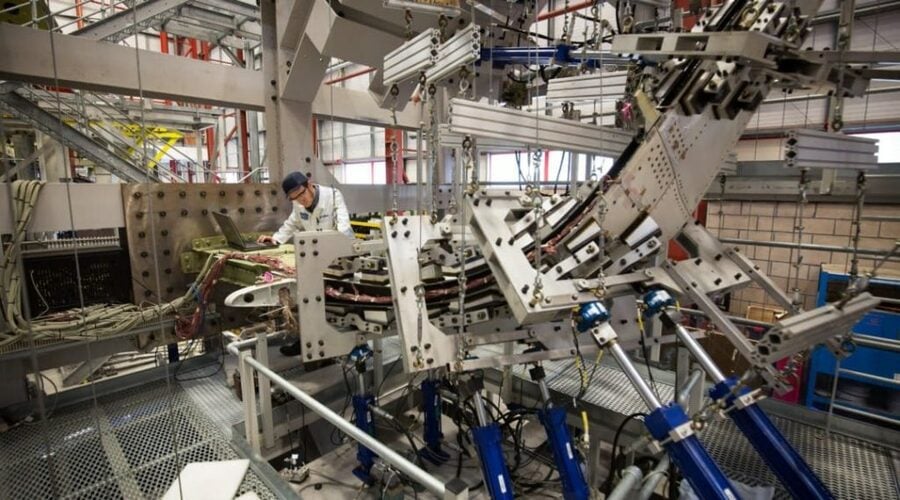A typical airframe fatigue test is divided in a number of fatigue load blocks. At the end of each flight block the test is stopped and the specimen is inspected for cracks. These manual inspections are time consuming and the time interval between these inspections is relatively large. Structural abnormalities may be detected too late, which could lead to retrofitting in-service aircraft in a worst-case scenario. Condition Based Inspections (CBI) of the specimen, instead of Risk Based Inspections (RBI), is a potential solution to reduce the total fatigue test duration and to quickly detect abnormalities. One of the implications is that more sensors are required to monitor the behaviour of the test specimen and to detect or predict structural failures.
“A full-scale airframe fatigue test can generate data at rates of up to 10 MB/s,
totalling to hundreds of terabytes at completion.
Data processing and analysis is a major bottleneck.”
Gantner Instruments has developed an innovative software platform, called GI.cloud, aimed at efficient processing of large volumes of measurement data and rapid analysis. GI.cloud combines a time series database management system with a powerful stream processing engine, offering a number of distinct advantages.
- Minimise your investment cost for IT and storage infrastructure in the test lab, whilst maintaining the necessary computing performance for test-critical data analysis tasks. Measurement data that you need to accessed right away (hot data) is available in the database. Data that you access less frequently, and is only needed for auditing or bookkeeping purposes (cold data), is kept in the stream processing platforms.
- Raw measurement data is safely stored in redundant, fault-tolerant clusters for automated backup. Flexible data aggregation ensures that your measurement data is continuous logged to the database at low sample rate. The database can replay the same data and store it at a higher sample rate in case detailed analysis around an unexpected event or specimen failure is required.
- Powerful querying capabilities enable you to analyse large amount of measurement data on-the-fly. Trend monitoring over the entire life of the fatigue test will quickly identify any significant change in strain between repetitive load conditions. Fatigue prediction and crack probability algorithms can identify possible loss of structural integrity during the test and immediately inform you when deviations occur.
Contact your local sales representative to learn more about GI.cloud.

More articles
Gantner Instruments Helps Flood Victims in the Philippines
Yet another terrible natural disaster has left its mark. In the Philippines, the typhoon Hayian has cost the lives of countless people. Gantner Instruments made a donation to support reconstruction.
Read more...GI.cloud – High-Performance Edge Computing Data Platform
The future brings more distributed and adaptive monitoring and control applications, this requires better and faster utilization of data streams. Reliable and distributed data acquisition are mandatory, this is why Gantner Instruments developed GI.cloud.
Read more...Measurements at -40°C ambient temperature
We just tested our Q.bloxx XL A104 TCK in the climate chamber at -40°C ambient temperature and it does a perfect job under these extreme conditions.
Read more...Integrate Gantner Instruments with NI LabVIEW
The easiest way to connect Gantner DAQ to your LabVIEW environment—now better than ever. Gantner Instruments understands the needs of engineers working across R&D, testing, and industrial automation. That’s why we’ve made it easier than ever to connect our modular, high-precision data acquisition systems, Q.series and Q.series X, with one of the most widely used engineering platforms: NI LabVIEW.
Read more...